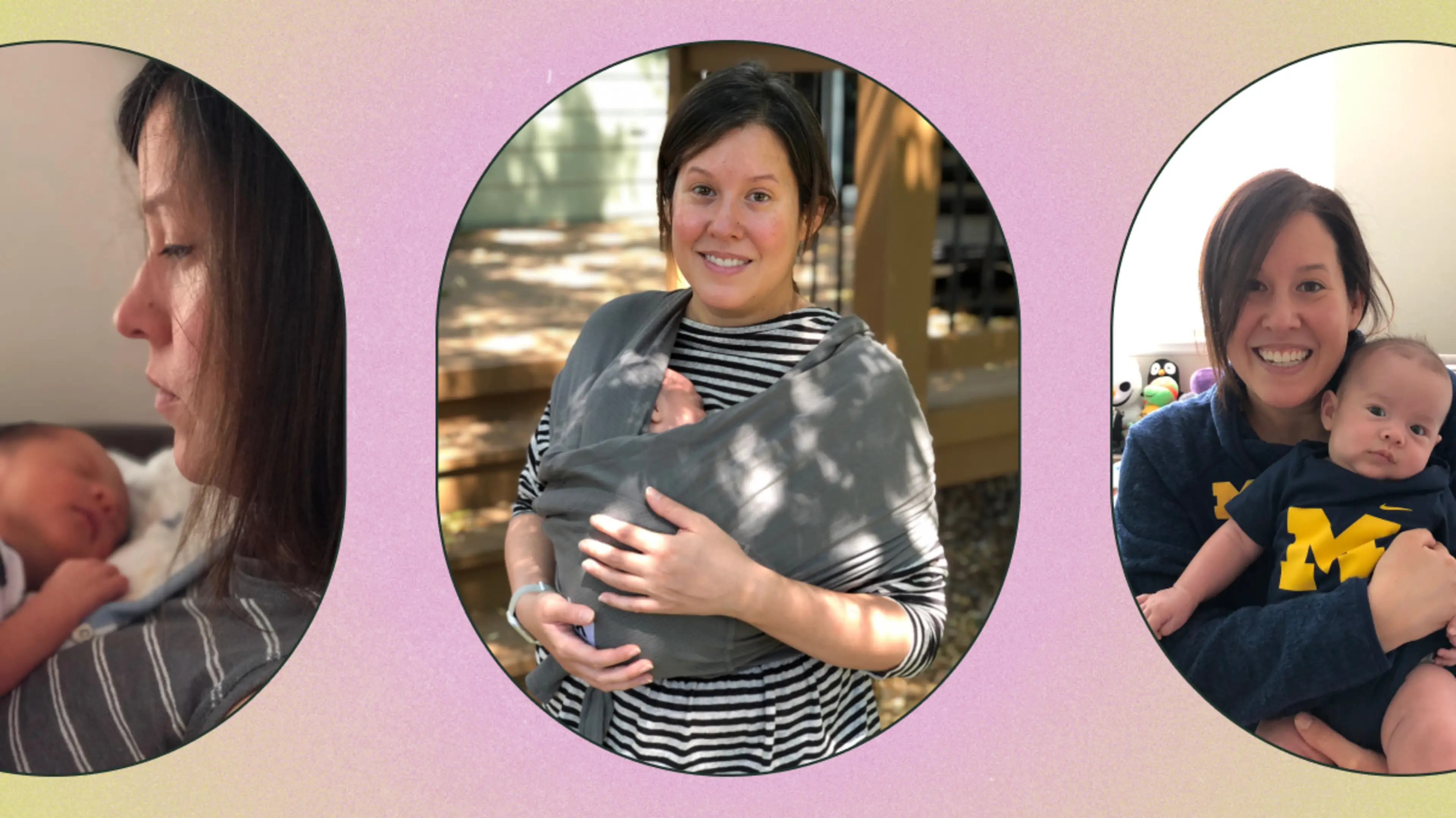TLDR: New moms can get so overwhelmed and consumed with their new baby and new role as a mother that they experience a temporary postpartum identity loss. This is normal and common, and there are ways to make it through, starting with prioritizing yourself and taking stock of all your feelings.
When you became a mother, chances are you stopped doing a lot of the things you used to. You probably don’t see your friends as often. Maybe you don’t have date nights with your partner anymore. You might not even have time to take a relaxing shower or enjoy a long bath like you used to.
You might realize you have no time for yourself: You don’t do what you want whenever you want to, eat what you want when you want it, or sleep when you want to—suddenly life is all about being a mother and taking care of your new baby.
If you feel like you’ve lost some sense of who you were before your baby, you may be experiencing postpartum identity loss. It’s okay—it’s super common to feel this way, and we have a few tips to help you adjust.
What Causes Postpartum Identity Loss?
Parents sometimes feel a loss of their identity after having a new baby because they no longer:
Have time alone
Have time for friends
Have time for hobbies
Feel confident (about their body, career, etc.)
Feel financially secure
Feel valued at work
All of these things (and even some not listed here) can lead to new parents feeling sad, guilty, insecure, or ashamed. Even if you were trying to conceive or planned your pregnancy, the shift in everything around you can still feel surprising.
Am I Experiencing Postpartum Depression?
Let’s have a quick check-in. How have you been lately? Like, really? If you’ve felt a little (or a lot) emotional lately, there might be something going on. If it hasn’t been happening for that long, it might be the “baby blues.”
Baby blues1 is sadness or moodiness that lasts two weeks or less. Hormone fluctuations, plus lack of sleep and the added adjustment to your newborn’s schedule—it’s a lot. So if you’ve been dealing with emotional highs and lows after giving birth, know you’re not alone. In fact, about 80% of new parents feel this way! The baby blues is a common experience, but definitely not something to simply brush off as “nothing.”
Dr. Marieme Mbaye2 , an ob-gyn and medical director for Noula3 , adds, “Having a baby is a life-changing experience. Almost every parent will feel overwhelmed, stressed, tired, and angry at some point. Add to that the fact that you’re likely sleep deprived and dealing with even more hormone shifts, it’s no surprise that ‘baby blues’ are as common as they are in the first few weeks after birth.”
While the baby blues isn’t considered a disorder, it’s still an emotional roller coaster—and for many moms, it’s really, really tough. Your feelings are valid and shouldn’t be discarded just because you think “it’s only the baby blues.” Take time for yourself to process what you’re feeling, and give yourself grace along the way.
So when is it more than the baby blues?
These are some symptoms to pay more attention to—they can point to something bigger going on, like postpartum depression or postpartum anxiety:
Anxiety or panic attacks
Fear of hurting your baby
Fear of being a bad mother
Feelings of shame, fear, or guilt
Loss of appetite
Loss of interest in things you enjoy
Not bonding with your baby
Overwhelming fatigue or tiredness
Restlessness
Thoughts of death or suicide
This isn’t an exhaustive list; take anything that seems unusual seriously. If any of these resonate with you and you’ve been feeling them for longer than two weeks, or they’re affecting your everyday life, give your primary care physician or ob-gyn a call. Dr. Mbaye says, “All of these are normal reactions, and you shouldn’t feel alone or ashamed in experiencing them. That said, if you (or someone who knows you well) notice signs or symptoms of postpartum depression for more than two weeks postpartum, you need to talk to your provider.” They can assess your symptoms and help you decide on treatment that’s right for you.
How to Feel Like Yourself Again
If you think you may be experiencing postpartum identity loss after giving birth, you aren’t alone. You aren’t a bad parent, and you won’t feel like this forever. With a few positive changes in your life, you can feel more connected to yourself, and not just in your role as a mother.
Reconnect with friends and family
It’s natural to lose touch with some people after the birth of your child. Life with a new baby changes your schedule, responsibilities, and priorities, and many new moms find themselves reaching out to loved ones less frequently, or they might find it tough to connect or respond to people. Both scenarios can lead to anxiety or feelings of guilt.
Do you have friends or family with kids? Maybe instead of dinners or nights out, you switch up your time together for playdates at the park. Of course, doing the things you used to do is still an option, but it’ll probably look a bit different than it did before. And that’s okay!
Send a quick text to anyone who has been on your mind lately and see if they’re open to meeting in a way that works for your new little one.
Another idea: ask for help planning an outing. Text that girlfriend you can lean on and just say, “I need to get out of the house and do something fun. Can you help me?” Ask them to plan, arrange, and coordinate. Friends want to help you and want to see you happy. This is a great task to hand off and get that friend time you deserve.
Find your village
Just like the idea of reconnecting with old friends, finding your village is a huge help for new parents (and experienced ones, too). Think of this as a group of people you can lean on to share your struggles with and ask questions—or, on the other hand, be an ear to listen.
The nice thing is that your village can be made of anyone. Friends, family, internet acquaintances, and more. If you don’t have anyone who immediately comes to mind, try looking for local mom groups on Facebook, see if there are clubs that meet in your area, or check out a support group that meets virtually.
It’s important to remember that with your new lifestyle, new friends may start to pop up while others may drift away. That’s normal. You need to focus on supporting you right now, and finding the connections that make you feel the most fulfilled. Great friends will always be there for you.
Try not to compare yourself
It’s very easy to get caught up in the comparison game nowadays, from picture-perfect social media influencers to movies that romanticize our lives. Motherhood has frequently been shown as a time of pure joy. Whatever it is that might be in your feed, on your TV, or in your head, whatever it is that might be making you feel like you aren’t good enough—we’re here to remind you that you are. Motherhood is hard, and you’re doing your best. There’s no need to compare, because we’re all on our own journey.
Make time for you
This one seems the most obvious, but it can also be one of the most difficult to actually do. Making time for you doesn’t simply mean going to the store alone, or cleaning the house, or taking a shower.
Making time for yourself means giving yourself permission to do things that you genuinely enjoy without guilt or shame. If you have a partner who can help with the kids, delegate a day and time with them where you’re totally off from parenting duties. Don’t have a partner? Maybe a grandparent or friend can help. If neither of these are an option, is there something in your day that can be deprioritized for you to have some time alone? Even if it’s just five minutes, it’s a start!
Practice mindfulness & meditation
There are plenty of mental, physical, and emotional benefits of meditation. The one we want to focus on here is that meditation can actually increase connection and awareness.
Yup, according to research, mindfulness and meditation can increase your feelings of compassion and empathy4 . It’s a great tool for motherhood, since practicing mindfulness may help you feel more compassionate toward yourself, your partner, and your children.
How Long Will I Feel This Way?
With all this big newness in your life, you’re probably wondering when you’ll start to feel like yourself again. Everyone is different—some moms say they feel like things slow down when their baby is around six months old, while others don’t feel it for about two years. Wherever you are in your postpartum journey, just know that things will get better eventually. We recommend keeping up with a self-care routine during and long after these symptoms, in addition to talking about all the changes and moods with your medical provider.
Conclusion
If we could leave you with one thing, it would be this: change is a constant in our lives. Whether you’re having a baby, moving to a new home, or starting a new job. Chances are, you’ve experienced a change in your life that left you feeling lost before and you made it out on the other side. It might have felt impossible at the moment, but you did it!
Becoming a mother can feel all-consuming. Every little thing in your life revolves around your baby right now. You eat, sleep, breathe, and use the bathroom around their schedule. Postpartum identity loss may seem unavoidable, but by making positive changes and taking small steps, you can begin to feel like yourself again.











